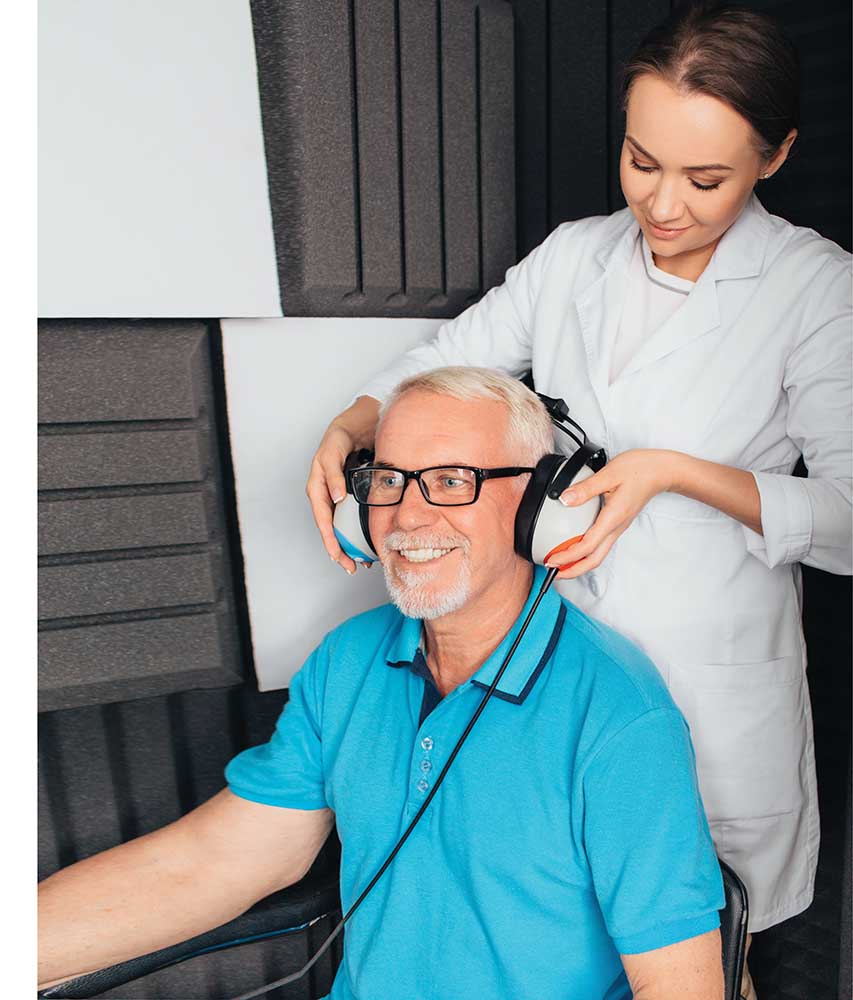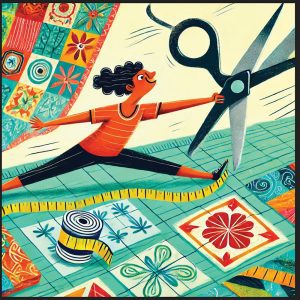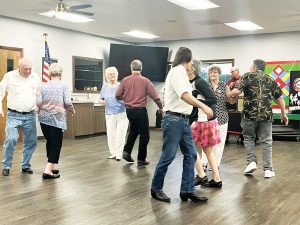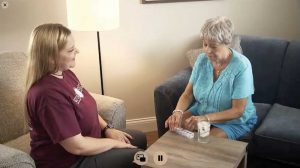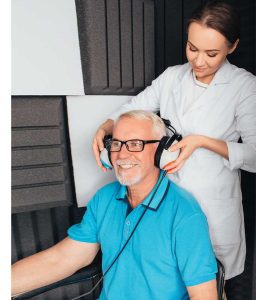By Alexander Germanis
Communication is a cornerstone of any functioning society. From populations numbering in the millions to the smallest family unit, communication is necessary for any relationship to grow and stay healthy.
Due to its binary nature, however, communication can easily break down. If either the sender or receiver fails in some way, the message is rendered either incomplete or misunderstood. The popular party game Telephone is a fine example of this phenomenon.
Preserving both ends of communication is important, but hearing is the side that often receives less attention. At Morton Audiology, however, preserving and enhancing people’s ability to hear is their goal. Through education, testing, innovative technology, and one-on-one care they are dedicated to preserving that vital hearing half of communication.
Dedicated to Connect
Being able to communicate has always been a passion for Morton Audiology’s owner Tessa Gilfillan-Jones, MS. Long before becoming an audiologist, she felt inspired to connect with those with hearing loss.
“I fell in love with American Sign Language in grade school and participated in plays and performances for the Deaf community in Bloomington/Normal for many years,” Tessa recalls. “Audiology seemed to be a natural progression that allowed me to still have connections to the community, but also serve a larger population.”
Starting as an audiologist at Morton Audiology in 2004, Tessa eventually purchased the practice in 2013 and has since run it with a dedicated care for the individual. While audiology is a science she appreciates, her niche, she says, lies in listening, connecting to people, and recognizing that solutions aren’t one-size-fits-all. “To find the right solution for the right person is an art as well,” she adds. “Every person, every situation, every day is different, and I love what I do.”
No Two Are the Same
Even though hearing loss is not a unique problem, how it affects people is very much an individualized issue. The solutions to the problem, likewise, can be very individualized.
“I always use the analogy of reading glasses versus prescription glasses,” explains Tessa. “Over-the-counter (OTC) devices absolutely have their place, and I have even recommended them to people before when both their loss and their lifestyle needs could be addressed effectively. However, for the most part, people will eventually realize those particular devices aren’t meeting their needs.”
Prescription hearing devices are fine-tuned to one’s specific hearing loss. Some are equipped with tinnitus masking, fall detection, health tracking, noise reduction tailored to levels of noise or even specific noises (as noises certainly differ), and other options.
The biggest concern with OTC aids is they entirely miss the true aspect of healthcare. “I know of a couple of individuals who had addressed their hearing difficulties with OTC devices, but since they had never seen an audiologist, major red flags were missed; the hearing loss was not just ‘typical’ and actually required medical intervention.”
Not needing a hearing test in order to buy an OTC aid is not a positive thing, Tessa states. If you’re having trouble hearing then a hearing test is a necessity, if for no other reason than to rule out more serious issues. “At that point,” Tessa adds, “if you have questions about whether OTC devices would fit your needs, your provider should be able to answer them factually, with all of the information at hand.”
Not Like Your Grandfather’s Hearing Aid
People of all ages tend to shake off the idea of using a hearing aid, even when it could substantially improve their quality of life. The excuses range from believing hearing aids make things sound unnatural, that they are ugly, obtrusive, they squeal, or that they’re only for the elderly.
“Hearing aids have come so far in the past 20 years, it can’t be understated that these aren’t your grandfather’s hearing aids,” Tessa insists. “The demographic for obtaining hearing aids has dropped significantly in that time, primarily due to people being more proactive about their health but also that hearing aids are no longer the ‘necessary evil’ they once were.”
Treating hearing loss should be about making life easier. Not only do they help make speech more intelligible, but they can also double as wireless Bluetooth earbuds through which one can listen to music or use for phone calls. Flexibility in adjustment, rechargeability, and dust- and moisture-resistance have significantly improved and expanded their use.
“I am a firm believer there are the right hearing aids out there for everyone,” Tessa says. “As an independent audiologist, I have the ability to fit each patient’s specific needs, wants, and budget with the manufacturer that is the best for them. I am lucky to be able to look at everyone who comes to my office as an individual and discuss with them what will achieve the most successful outcome. When I’m talking to someone about their medical history, experiences, challenges, lifestyle, and then performing the hearing evaluation, I have a Rubik’s cube of options spinning in my head to try to determine what the best match would be. And if we don’t ultimately succeed with that choice, we can try something completely different!”
The Wisdom of Prevention
Whether attending a concert, blasting music on headphones or earbuds, or blaring stereos in their cars, it’s not hard to see how the younger generations tend to ignore their hearing health. Thankfully, Tessa has been witnessing an overall shift from this behavior.
“People are becoming much more proactive about their overall health,” she says. “The demographic of individuals coming in for a baseline hearing test due to either concerns or just never having had a hearing test is getting younger and younger, and that is excellent. With almost everything in healthcare, it’s much easier to catch and either monitor or treat something early, rather than waiting until there is a significant impact on your quality of life.”
Unfortunately, we all experience some degree of hearing loss as we age, but hearing loss due to noise exposure is completely preventable. “A rule of thumb is if you need to raise your voice to be heard by someone standing near you, you should be wearing hearing protection,” Tessa says. “If you are an avid earbud user, nobody else should be able to hear your music.”
The safety limit for most earbuds is about 50 to 60 percent of maximum volume. “The lower the volume, the longer you can safely listen,” Tessa adds, “but taking breaks is also prudent and recommended to rest your ears.”
For Your Overall Health
Author and activist Helen Keller said, “Blindness cuts us off from things, but deafness cuts us off from people.”
As sad as it is, not enough people realize this until it is too late. Tessa says this is simply because hearing is typically low on the list of healthcare issues. “However, current research shows that hearing loss can correlate with many other health conditions, both physical and cognitive,” she points out.
Furthermore, hearing loss can often be missed or misdiagnosed as dementia. The latter can happen when someone answers questions they think they hear but were not actually asked. “Feeling left out of conversation can lead to social isolation, which can then contribute to depression or anxiety,” Tessa explains. “Hearing loss can put people at a significantly higher risk for falls. The list goes on and on, and it’s becoming more apparent with each study released that hearing is most certainly a crucial part of overall health.”
At the most basic level, hearing is what keeps you connected to the world around you. For all those sounds in nature you wish to enjoy, for those inspiring songs you wish to hear over and over, and for all those conversations with loved ones you want to hold dear, the solution is simple: Take your hearing health seriously.
The best way to start is by visiting Tessa at Morton Audiology to find out what can be done to preserve your hearing for the years to come and let her help you always stay connected.
Morton Audiology is located at 320 South Main Street in Morton, Illinois. To connect
with us, please telephone or text at (309) 263-7545. Or set up an appointment
online at www.mortonaudiology.com.
